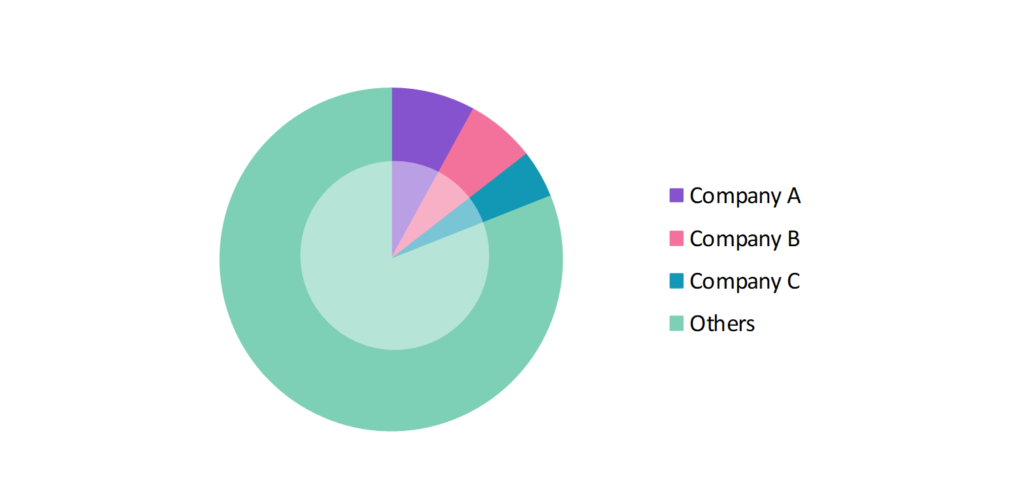Home Healthcare Market: Size, Share, Trends & Forecast (2024-2029)
The market report offers a detailed analysis segmented by Product (Therapeutic Products, Testing, Screening and Monitoring Products, Mobility Care Products); by Service (Skilled/Unskilled Nursing, Rehabilitation Therapy, Hospice and Palliative Care, Unskilled Care, Respiratory Therapy, Infusion Therapy, Pregnancy Care); by Geography (North America, South America, Asia Pacific, Europe, The Middle East, Africa).
Outlook

- The home healthcare market is estimated to be at USD 344.53 Bn in 2025 and is anticipated to reach USD 516.18 Bn in 2030.
- The home healthcare market is registering a CAGR of 8.42% during the forecast period 2025-2030.
- The global home healthcare market is experiencing rapid growth due to the increasing elderly population, rising prevalence of chronic diseases, and technological advancements. Home healthcare services provide medical care in the comfort of patients’ homes, reducing hospital visits and easing the burden on healthcare facilities.
Request a free sample.
Ecosystem

- The global home healthcare industry participants constantly develop strategies to preserve a competitive advantage.
- These companies focus on investment in R&D, technological innovation, and product launches. They offer telehealth and AI-driven platforms for chronic care and expand services to improve patient outcomes with advanced technologies.
- Several important entities in the home healthcare market include Fresenius SE & Co. KGaA; Abbott; GE Healthcare Technologies, Inc.; Koninklijke Philips N.V.; ResMed Inc.; and others.
Ask for customization.
Findings
| Attributes | Values |
|---|---|
| Historical Period | 2019-2023 |
| Base Year | 2024 |
| Forecast Period | 2025-2030 |
| Market Size (2024) | USD 344.53 Bn |
| Market Size (2029) | USD 516.18 Bn |
| Growth Rate | 8.42% CAGR from 2025 to 2030 |
| Key Segments | Product (Therapeutic Products, Testing, Screening and Monitoring Products, Mobility Care Products); Service (Skilled/Unskilled Nursing, Rehabilitation Therapy, Hospice and Palliative Care, Unskilled Care, Respiratory Therapy, Infusion Therapy, Pregnancy Care); Geography (North America, South America, Asia Pacific, Europe, The Middle East, Africa) |
| Key Vendors | Fresenius SE & Co. KGaA; Abbott; GE Healthcare Technologies, Inc.; Koninklijke Philips N.V.; ResMed Inc. |
| Key Countries | The US; Canada; Mexico; Brazil; Argentina; Colombia; China; India; Japan; The UK; Germany; France; UAE; Saudi Arabia; Egypt; South Africa |
| Largest Market | North America |
Get a free quote.
Trends
- Telehealth Integration in Home Care: Telehealth is becoming integral to home healthcare, enabling remote monitoring and consultations via video calls and digital devices. This approach enhances patient accessibility, allowing individuals to receive timely care from the comfort of their homes while fostering better engagement in their health management.
- Wearable Technology for Health Monitoring: Home healthcare emphasizes wearable devices to monitor vital signs such as heart rate, glucose levels, and physical activity. In 2022, Fitbit and Apple Watch incorporated health-monitoring features, empowering patients and caregivers with real-time data to manage chronic conditions.
- Personalized Care with AI and Data Analytics: AI-powered tools and data analytics are being used to personalize treatment plans in home healthcare. For example, in 2023, IBM Watson Health introduced AI-driven platforms to assist home caregivers in creating tailored care strategies, improving patient outcomes, and predicting future healthcare needs.
Speak to analyst.
Catalysts
- Rising Demand for Postoperative Care at Home: The growing preference for recovering after surgeries has increased the demand for home healthcare services. In 2022, hospitals in the U.S. began partnering with home healthcare providers to offer postoperative monitoring, which reduces the need for hospital stays and lowers overall healthcare costs.
- Growing Preference for Home-Based Palliative Care: The preference for palliative care in the comfort of home, especially for terminally ill patients, is increasing due to its focus on enhancing quality of life and providing personalized support. This approach allows patients to receive compassionate care surrounded by loved ones, reducing the stress of hospital stays.
- Government Support and Favorable Policies: Many governments promote home healthcare through favorable policies, reimbursement schemes, and incentives to reduce the strain on healthcare facilities. In 2023, the U.S. government expanded its Medicare reimbursement coverage for telehealth and home healthcare services, boosting market growth.
Inquire before buying.
Restraints
- Lack of Skilled Home Healthcare Professionals: A shortage of trained caregivers and home healthcare professionals poses a significant challenge to the market’s growth, impacting the availability and quality of care for patients at home. This gap can lead to increased workloads for existing staff, resulting in burnout and potentially compromising patient safety.
- High Cost of Technological Adoption: The initial cost of adopting advanced technologies like Artificial Intelligence, the Internet of Things, and wearable devices can be high for smaller home healthcare providers, posing a barrier to implementation. These expenses may include not only the technology itself but also training staff and maintaining systems.
- Regulatory Hurdles and Reimbursement Issues: Varying regulations across regions and slow reimbursement processes can hinder the growth of home healthcare services. In 2023, European home healthcare providers faced delays in reimbursement approvals due to complex regulatory frameworks, affecting market penetration.
Personalize this research.
Hotspot

Explore purchase options.
Table of Contents
| 1. Introduction 1.1. Research Methodology 1.2. Scope of the Study 2. Market Overview / Executive Summary 2.1. Global Home Healthcare Market (2019 – 2023) 2.2. Global Home Healthcare Market (2024 – 2030) 3. Market Segmentation 3.1. Global Home Healthcare Market by Product 3.1.1. Therapeutic Products 3.1.2. Testing, Screening and Monitoring Products 3.1.3. Mobility Care Products 3.2. Global Home Healthcare Market by Service 3.2.1. Skilled/Unskilled Nursing 3.2.2. Rehabilitation Therapy 3.2.3. Hospice and Palliative Care 3.2.4. Respiratory Therapy 3.2.5. Infusion Therapy 3.2.6. Pregnancy Care 4. Regional Segmentation 4.1. North America 4.1.1. The US 4.1.2. Canada 4.1.3. Mexico 4.2. South America 4.2.1. Brazil 4.2.2. Argentina 4.2.3. Colombia 4.2.4. Rest of South America 4.3. Asia Pacific 4.3.1. China 4.3.2. India 4.3.3. Japan 4.3.4. Rest of Asia Pacific 4.4. Europe 4.4.1. The UK 4.4.2. Germany 4.4.3. France 4.4.4. Rest of Europe 4.5. The Middle East 4.5.1. UAE 4.5.2. Saudi Arabia 4.5.3. Rest of the Middle East 4.6. Africa 4.6.1. Egypt 4.6.2. South Africa 4.6.3. Rest of Africa 5. Value Chain Analysis of the Global Home Healthcare Market 6. Porter Five Forces Analysis 6.1. Threats of New Entrants 6.2. Threats of Substitutes 6.3. Bargaining Power of Buyers 6.4. Bargaining Power of Suppliers 6.5. Competition in the Industry 7. Trends, Drivers and Challenges Analysis 7.1. Market Trends 7.1.1. Market Trend 1 7.1.2. Market Trend 2 7.1.3. Market Trend 3 7.2. Market Drivers 7.2.1. Market Driver 1 7.2.2. Market Driver 2 7.2.3. Market Driver 3 7.3. Market Challenges 7.3.1. Market Challenge 1 7.3.2. Market Challenge 2 7.3.3. Market Challenge 3 8. Opportunities Analysis 8.1. Market Opportunity 1 8.2. Market Opportunity 2 8.3. Market Opportunity 3 9. Competitive Landscape 9.1. Fresenius SE & Co. KGaA 9.2. Abbott 9.3. GE Healthcare Technologies, Inc. 9.4. Koninklijke Philips N.V. 9.5. ResMed Inc. 9.6. Company 6 9.7. Company 7 9.8. Company 8 9.9. Company 9 9.10. Company 10 |
Know the research methodology.
Home Healthcare Market – FAQs
1. What is the current size of the home healthcare market?
Ans. In 2025, the home healthcare market size is USD 344.53 Bn.
2. Who are the major vendors in the home healthcare market?
Ans. The major vendors in the home healthcare market are Fresenius SE & Co. KGaA; Abbott; GE Healthcare Technologies, Inc.; Koninklijke Philips N.V.; ResMed Inc.
3. Which segments are covered under the home healthcare market segments analysis?
Ans. The home healthcare market report offers in-depth insights into Product, Service, and Geography.
